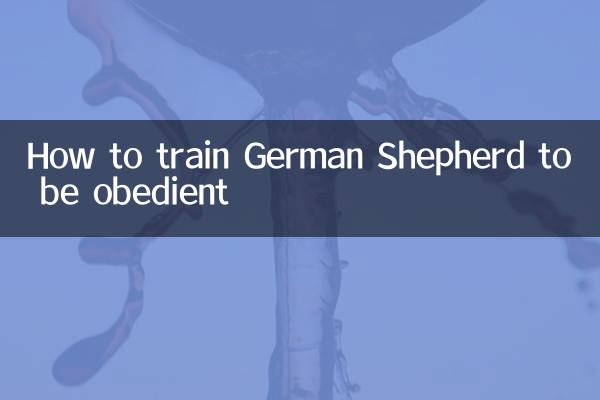How to train German Shepherd to be obedient
The German Shepherd Dog (German Shepherd) is known for its high intelligence, loyalty and obedience. It is an excellent police dog, military dog and family companion dog. But even a smart German Shepherd needs scientific training to become an obedient partner. The following is a detailed guide on how to train your German Shepherd to be obedient. It provides you with structured data and practical suggestions based on the hot topics and hot content on the Internet in the past 10 days.
1. Basic principles of German Shepherd training

Training your German Shepherd to be obedient requires following the following basic principles:
| principles | Description |
|---|---|
| Positive motivation | Reward correct behavior with treats, petting, or verbal praise and avoid physical punishment. |
| Consistency | Instructions and rules need to be consistent to avoid confusing the dog. |
| step by step | Start with simple instructions and gradually increase the difficulty. |
| Patience | German Shepherds have strong learning abilities, but they still need repeated practice. |
2. Basic obedience training instructions
The following are the core instructions and training methods of German Shepherd basic training:
| instructions | training method | Things to note |
|---|---|---|
| Sit | Hold the treat to guide the dog's head upward, and reward it immediately after sitting down naturally. | Avoid pressing the buttocks and let the dog complete the movement on its own. |
| Down | Starting from the "sit down" position, guide the snack toward the ground and reward after completing the lying down action. | In the early stage, you can train in a low space to avoid jumping. |
| Come | Use a long rope to assist, call the name and pull the rope gently, and give a reward when it arrives. | Do not call out during punishment to avoid creating negative associations. |
| Stay | Start with short periods of stillness and gradually increase the time and distance. | Use clear gestures (such as palms facing forward) and gradually add distractions. |
3. Advanced training techniques
After your German Shepherd masters basic commands, you can try the following advanced training:
1.Attention training:Train your dog's focus with the "look at me" command by holding a treat close to the face and rewarding your dog immediately when he looks into his eyes.
2.Food refusal training:To prevent accidentally eating dangerous items, you can place food on the ground, say "no" when the dog tries to approach, and give better rewards after obedience.
3.On-the-go training:Correct the rushing behavior, use a short leash, and continue to reward the dog when it is in the correct position. Sudden turns can interrupt the inertia of forward motion.
4. Solutions to common problems
According to the recent hot discussions on pet raising, the following are common problems and solutions in German Shepherd training:
| question | Reason | solution |
|---|---|---|
| Instruction execution is unstable | The training environment is single and no interference training is carried out | Step by step review of instructions in complex environments such as parks and streets |
| Losing interest in snacks | Single reward method or excessive reliance on food | Switch to a toy reward or intermittent reward strategy |
| Food/toy protection behavior | The instinct to possess resources is not properly guided | Cultivate a sense of sharing through exchange games and avoid taking by force |
| Hypervigilance at night | The protective nature has not been properly channeled | Set up fixed warning areas and conduct special training on "quiet" instructions |
5. Suggestions on training time arrangements
Scientific time allocation can significantly improve training efficiency:
| age group | Daily training time | Training focus |
|---|---|---|
| 2-4 months | 3-5 times × 5 minutes | Socialization, basic instruction enlightenment |
| 4-8 months | 3 times × 10-15 minutes | Consolidate basic instructions and start on-the-go training |
| 8 months or more | 2 times × 20 minutes | Advanced obedience training, special skill development |
6. The relationship between nutrition and training
Recent pet nutrition research shows that diet quality directly affects training effects:
1. Avoid eating large amounts one hour before training to maintain moderate hunger and increase motivation.
2. Choose high-protein, easy-to-digest training snacks, such as freeze-dried chicken nuggets
3. Omega-3 fatty acids help improve learning ability and concentration
Conclusion
Training a German Shepherd to be obedient is a systematic project that requires the owner to invest time, patience and scientific training methods. Remember that every dog has a unique personality and the training pace should be adjusted according to individual differences. Recent canine behavioral studies confirm that a good trusting relationship between owners and pets is the key to success, rather than training techniques. Adhere to positive guidance, and your German Shepherd will eventually become an enviable and perfect partner.

check the details

check the details